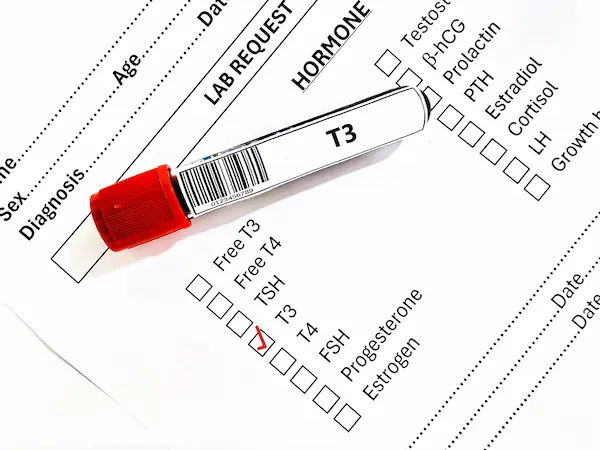Crucial Lab Tests For People On Long-Term Medication
Discover crucial lab tests for those on long-term medication. This complete guide helps monitor side effects, assess organ health, and ensure safe, effective treatment over time.

Written by Dr. Shaik Abdul Kalam
Reviewed by Dr. Rohinipriyanka Pondugula MBBS
Last updated on 9th Sep, 2025

Crucial Lab Tests For People On Long-Term Medication: A Complete Guide To Monitoring Medicine Side Effects And Organ Health
Long-term medications are a lifeline for millions of people managing chronic health conditions such as diabetes, high blood pressure, epilepsy, arthritis, depression, and heart disease. While these medicines are vital for symptom control and disease management, they can sometimes put stress on the liver, kidneys, or even the blood. Over time, this can lead to complications if not monitored carefully. This is why regular testing is critical to catch any signs of adverse effects early. A proper long-term med test panel ensures that your treatment is both effective and safe. In this comprehensive guide, we’ll explore which blood and urine tests are essential for people on long-term medication. We'll also explain how these tests help monitor for medicine side effects and support healthy organ function, especially the liver and kidneys. Whether you're taking medication for months or years, knowing what to test and when can protect your health and improve outcomes.
Why is Monitoring Essential for Chronic Medication Users?
Medicines work by altering certain functions in your body. While this is beneficial in treating disease, it can sometimes cause unintended stress or toxicity to vital organs over time. Here’s why you need regular medicine side effects tests:
- To monitor organ function (especially the liver and kidneys)
- To ensure safe drug levels in the blood
- To avoid toxicity and adjust dosage if needed
- To check for complications like anaemia or electrolyte imbalance
- To personalise and fine-tune your treatment over time
Anyone on long-term medication, especially seniors, people with multiple conditions, or those taking high doses, should consider periodic lab testing as part of routine care.
Who Should Get Long Term Med Test Packages?
Long-term medication users across the following conditions should take these tests regularly:
- Hypertension (Blood Pressure Medication): People on long-term blood pressure medication need regular kidney function, electrolyte, and lipid profile tests. These help monitor side effects of antihypertensives and assess cardiovascular risk.
- Diabetes (Oral hypoglycaemics, Insulin): Diabetics require periodic blood sugar, HbA1c, kidney, liver, and lipid tests. These tests help evaluate treatment efficacy and detect early complications like nephropathy or liver dysfunction.
- Thyroid Disorders (Thyroxine, Antithyroid Drugs): Thyroid patients need routine T3, T4, and TSH monitoring. Long-term therapy can affect heart rate, metabolism, and bone health, making regular testing essential.
- Mental Health Conditions (Antidepressants, Mood Stabilisers): These medications can impact liver function, blood counts, and sodium levels. Regular LFTs, CBC, and metabolic panels are important for safe, effective mental health treatment.
- Epilepsy (Anti-epileptics): Anti-epileptics can cause liver toxicity, bone loss, or haematological issues. Regular liver function tests, vitamin D levels, and drug level monitoring are recommended.
- Arthritis or Autoimmune Conditions (Steroids, Methotrexate): Immunosuppressive and steroidal medications can affect the liver, kidney, and immune system. Regular CBC, LFT, and creatinine tests are needed to detect early complications.
- Cholesterol Management (Statins): Statins may cause liver enzyme elevation or muscle damage. Routine liver function tests and creatine kinase levels help ensure continued safe use of these medications.
- Heart Diseases (Beta blockers, Diuretics, Anticoagulants): Patients with cardiac conditions require electrolyte, kidney, INR/PT, and ECG monitoring. These tests help avoid complications like arrhythmias, dehydration, or bleeding.
- Tuberculosis or HIV (Multi-drug Regimens): Long-term use of multiple potent drugs can burden the liver, kidneys, and immune system. Regular LFTs, kidney panels, and complete blood counts are vital for safe management.
- Organ Transplant Recipients (Immunosuppressants): Immunosuppressive therapy raises the risk of infections and organ toxicity. Frequent testing of drug levels, kidney/liver function, and infection markers is critical for long-term graft survival.
Most Crucial Lab Tests for People on Long-Term Medication
Below is a detailed look at the most important blood and urine tests you should consider as part of your long term med test plan:
1. Liver Function Test (LFT)
The liver plays a major role in metabolising most medicines. Over time, some drugs can cause liver inflammation or toxicity, especially paracetamol, anti-TB drugs, statins, methotrexate, and certain anti-epileptics.
Why it's important: Monitors for liver enzyme elevation, jaundice risk, or liver cell damage.
Frequency: Every 3 to 6 months depending on medication type.
Book Liver Function Test (LFT) Here
What it checks:
- ALT (Alanine Transaminase)
- AST (Aspartate Transaminase)
- ALP (Alkaline Phosphatase)
- Bilirubin
- Albumin
2. Kidney Function Test (KFT)
Many drugs are excreted via the kidneys. Long-term use of NSAIDs (painkillers), diuretics, or certain antibiotics can stress the kidneys.
Why it's important: Detects early signs of kidney dysfunction before symptoms appear.
Frequency: Every 6 months or more frequently if you have diabetes or high blood pressure.
Book Kidney Function Test (LFT) Here
What it checks:
- Urea
- Creatinine
- eGFR (Estimated Glomerular Filtration Rate)
- Uric acid
Crucial Lab Tests For People On Long-Term Medication:
3. Complete Blood Count (CBC)
Long-term medicines, especially immunosuppressants, chemotherapy, and anticonvulsants, can affect the bone marrow, leading to anaemia or low white cell counts.
Why it's important: Helps identify bone marrow suppression and overall immune status.
Frequency: Every 3 to 6 months, or as directed.
Book Complete Blood Count (CBC) Here
What it checks:
- Haemoglobin
- WBC (White Blood Cell Count)
- Platelet count
- RBC indices
4. Electrolyte Test
Electrolyte imbalance is common with diuretics, blood pressure drugs, and steroids.
Why it's important: Checks for low sodium, potassium, or calcium, which may cause muscle weakness, arrhythmias, or fatigue.
Frequency: Quarterly to bi-annually.
What it checks:
- Sodium
- Potassium
- Chloride
- Calcium
5. Blood Sugar Test and HbA1c Test
Steroids, antipsychotics, and some anti-HIV drugs can increase blood sugar.
Why it's important: Helps prevent medication-induced diabetes.
Frequency: Every 3 months.
What it checks:
- Fasting glucose
- HbA1c (average 3-month glucose)
6. Thyroid Profile Test
Lithium, amiodarone, and antipsychotics may disrupt thyroid hormones.
Why it's important: Monitors thyroid balance and ensures that medicine isn’t suppressing or over-stimulating thyroid function.
Frequency: 6 months to annually.
Book Thyroid Profile Test Here
What it checks:
- TSH
- Free T3 and Free T4
7. Drug Level Monitoring (Therapeutic Drug Monitoring)
Some medicines require regular measurement of drug levels in the blood to avoid under-dosing or toxicity.
Common drugs needing monitoring:
- Phenytoin
- Lithium
- Digoxin
- Valproic acid
- Methotrexate
- Cyclosporine
Why it's important: Ensures safe and effective therapeutic levels.
Frequency: As advised by your doctor (often every 3 to 6 months).
8. Urine Routine and Microscopy
Certain medications may cause urinary tract complications or kidney stones.
Why it's important: Screens for protein, sugar, pus cells, or crystals in urine.
Frequency: Annually or more frequently based on symptoms.
9. Lipid Profile
Statins are commonly used to lower cholesterol. Monitoring ensures their effectiveness and checks for adverse effects on the liver and muscle.
Why it's important:
- Evaluates cholesterol control and heart disease risk.
Frequency: Every 6 to 12 months.
How to Choose the Right Long Term Med Test Package?
Apollo 24|7 offers curated test panels for long-term medication users. Some useful points to keep in mind while selecting packages include:
- Choose a test package that matches your health condition, such as diabetes, thyroid, or hypertension.
- Consider the medications you take, as different drugs affect specific organs and functions.
- Select packages based on how often you need testing, monthly, quarterly, or bi-annually.
- Ensure the package includes essential tests like LFT, KFT, CBC, lipid profile, and relevant drug markers.
- Opt for labs that allow you to customise the package as per your doctor's advice.
- Consult your doctor or pharmacist before booking to confirm the right tests and frequency.
- Choose NABL or ISO-accredited labs for accurate, reliable, and standardised results.
What Preparation Is Required?
Most medicine side effects tests require minimal preparation. However:
- Fasting: Required for lipid profile, fasting glucose, and some kidney/liver function markers (8 to 10 hours)
- Hydration: Stay well-hydrated to ensure smooth sample collection
- Medication history: Inform your doctor/lab technician about your current medication list
- Timing: Some drug level tests require sample collection just before the next scheduled dose (trough level)
What to Do with the Test Results?
- Once your long term med test results are available:
- Review them with your doctor to adjust medications if needed
- Do not stop or change doses on your own
- Follow up with repeat tests if advised
- Monitor symptoms like fatigue, yellowing eyes, or unusual bleeding, and report them promptly
Conclusion
Being on chronic medication requires not just discipline in taking your pills, but also vigilance in monitoring how those medicines are affecting your body. Regular blood and urine tests help you and your doctor detect problems early, adjust treatment, and prevent serious complications. Whether it’s your liver function, kidney performance, blood counts, or drug levels, staying informed and proactive is the best way to safeguard your health.
With Apollo 24|7’s reliable lab services, you can book medicine side effects test packages online and even opt for convenient home sample collection. Take control of your health today. Choose the right long term med test and stay ahead of any complications.
Explore Crucial Lab Tests for People on Long-Term Medication at Apollo 24|7
Crucial Lab Tests For People On Long-Term Medication:
₹419(₹1047)60% off
₹800(₹2000)60% off
₹1029(₹2573)60% off
₹659(₹1647)60% off
₹829(₹2072)60% off








